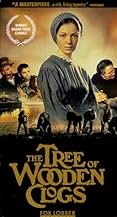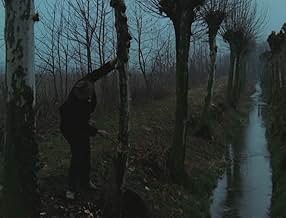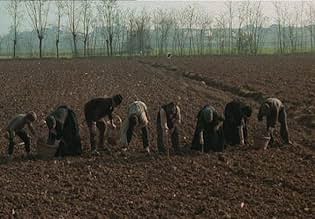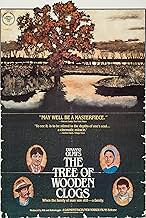Peasant life in a feudal farm in rural Italy at the end of the 19th century.Peasant life in a feudal farm in rural Italy at the end of the 19th century.Peasant life in a feudal farm in rural Italy at the end of the 19th century.
- Won 1 BAFTA Award
- 18 wins & 1 nomination total
- Director
- Writer
- All cast & crew
- Production, box office & more at IMDbPro
Featured reviews
It is one of those films that is seemingly about nothing, but could be about everything. i didn't find its 3 hour length to be a problem. It is almost like watching a documentary about peasant life right down to its hand held camera techniques. It is subtle though. Not the shaky-cam or vomit-cam stuff you see today.
The cast is entirely made up of non-actors. Real peasants. And apparently it was shot using its local dialect, Bergamasque which then had to be dubbed into Italian for the Italian market. Olmi explains in the DVD extras that all of the non-actors did their own dubbing which I have to say is quite a technical accomplishment for amateurs.
The film opens with a farmer chopping the head off of a goose. A little later on the controversial scene depicting the slaughter and butchering of a hog is played out in almost real time. It is very graphic and quite disturbing. But just when I thought you would never want your kids to see this, Olmi cuts to two three year-old peasant kids watching the hog die with unbothered fascination. This is real life on a real farm.
And you can tell that it is done by a proficient butcher and is not a gratuitous add-on for exploitation. It is just something that Olmi has selected to include in the film.
I'd suggest this one for a change of pace.
Don't be afraid of this film. It does not actually seem long, nor does it seem aimless or plotless. While one may say that "the whole pesant community" is the real protagonist there are clearly defined characters in the film whose narratives we follow. In fact, the films strategy is one of integration of these narrative strands in a seemingly coherent and logical way. A wonderful, very emotionally moving experience with a clear, sharp, political analysis.
The film slowly unveils to the viewers one year in the life of Italian peasants at the close of the nineteenth century. That's about it. There's no hero, no antagonist, and no great wrong that gets set right; it's simply a slice of life. I do not want to reveal too much of the story because I think it will spoil it for the viewer.
The film can serve as an educational tool for viewers with children. It's like going to an outdoor historical museum, only the viewer gets to see everything that it would take one whole year to see at the museum (without the crowds). For example, the director takes the time to show painstakingly what it was like to wash clothes one hundred years ago. It's essentially a living documentary of late nineteenth century Italian provincial life.
Most American audiences will have to get used to the slow pace of the film. Even the humor is extremely subtle. Surprisingly, I enjoyed the pace. The pace was silent, peaceful, and steadfast just as the families are in the film. To me it is an escape (ironically an escape from an escape) from many of today's films that just explode with sound effects and rock music; films that move at blurring speed with scene cuts that are made with the intent to maximize audience stimulation but often with the result of increasing our stress level. This movie is a restful reprieve.
It was like if someone would've been reading me a poem whilst watching such beautiful landscapes. And all through that, you feel in your own skin the love for their own soil. it seems as if they had been rooted to the grounds.
Certainly it is not for everyone's tastes but it is truly a moving experience.
Axel.
Did you know
- TriviaAll the actors were real peasants from the Bergamo province, in Italy. They had no acting experience at all.
- GoofsWhen the children are making music with pots and pans, the 'instruments' of the little girl are switching from one hand to the other when the camera looks at her from the other side.
- Quotes
[first lines]
Don Carlo: That boy should be going to school.
Batistì: Yes but six kilometers to school and six kilometers back seems a lot.
Don Carlo: He's young, he has strong legs.
Batistì: Just when we're about to have another baby. He could have started helping me around the house.
Don Carlo: He'll help you even more when he's older. Let providence provide for now.
Batistì: I grew up without ever seeing the inside of a school.
Don Carlo: That's not a good reason, and you know it. If God has given your boy a good mind, it's a sign he's expecting more of him. As the boy's father, it's your duty to do God's bidding.
- Crazy creditsQuite strangely, the names of the actors are listed as "last name first name", while the names of the rest of the crew are correctly listed as "first name last name".
- Alternate versionsThere are two versions of this movie: one which is spoken in the dialect of Bergamo, Italy, and one in which the actors dubbed themselves in Italian.
- ConnectionsEdited into Bellissimo: Immagini del cinema italiano (1985)
- SoundtracksIch steh' mit einem Fuß im Grabe BWV, 156
Composed by Johann Sebastian Bach
Performed by Fernando Germani
- How long is The Tree of Wooden Clogs?Powered by Alexa
Details
Box office
- Gross worldwide
- $9,367
- Runtime3 hours 6 minutes
- Sound mix
- Aspect ratio
- 1.33 : 1
Contribute to this page



















